Field visits in Spain and the Baltic States show: Europe’s forests are threatened by forest fires, clear-cutting and the climate crisis. The EU forest strategy aims to improve European forest management.
Forests are our greatest allies in the fight against the climate crisis. Healthy forests help absorb CO2 from the atmosphere and regulate the water cycle. They help protect against soil erosion and provide a habitat for a huge number of plants, animals and insects. Therefore, protecting forests is central to achieving our climate goals. As shadow rapporteur for the EU Forest Strategy, my goal is to improve the protection of forests in Europe. And there is still a lot to be done:
Field visits in Austria, Spain, Estonia, Poland and Slovakia
For the last couple of months I have been traveling all over Europe to see the state of Europe’s forests on the ground. The results were sobering.
Monocultures
Many forests in Europe are managed as monocultures. This makes it easier to work with heavy machinery. When all the trees in a large area are of the same species and the same age, and are neatly arranged in rows, it is very easy to carry out large-scale clear-cutting with huge harvesting machines. However, this type of management leads to the loss of the forest’s climate protection function. This is because monocultures, which are also regularly clear-cut, do not provide a good living environment for insects or other animals or plants. As a result, biodiversity is lost in these areas. Heavy harvesting equipment also compacts the soil, which destroys life in the soil and leads to soil erosion. As a result, water cannot be absorbed as well and the area becomes vulnerable to mudslides, landslides, avalanches, floods but also droughts. In Andalusia I saw huge monocultures of eucalyptus. These trees further drain the already dry soil and are also toxic to most other plants in the region.
Forest Fires
In Málaga, Andalusia, I visited a national park that is increasingly threatened by forest fires. 80% of the forest fires were started by humans, often presumably on purpose. The climate crisis only intensifies the problem. Drought is a serious threat to forests in Europe. Again, diversification of forests with adapted native tree species is the best answer.
Clear-cutting
In the Basque Country, near Bilbao, we found a continuous clear-cut of 500ha. I also saw massive clearcutting in Estonia, Poland, Slovenia, some even in Natura 2000 areas. These clearcut and reforestation areas release CO2 and destroy the habitat of many animal and insect species. Clear-cutting is not only a climate disaster, but also more expensive in the long run than natural regeneration. Replanting completely clear-cut parts of the forest is time-consuming and cost-intensive due to the elaborate care the soil and young plants need. In contrast, regeneration in near-natural forests occurs naturally, the trees best adapted to the site establish themselves, the forest becomes more resilient and diverse, and it does not take decades for a completely cleared area to grow back.

Wood for biomass
Together with Eestimaa Looduse Fond and Päästame Eesti Metsad MTÜ, we uncovered that the pellet company Graanul Invest in Estonia is legally allowed to clear-cut trees for biomass in Natura 2000 areas, i.e. in nature reserves. Whole tree trunks are completely used for pellet production. That is a massive waste of resources. Only waste material should be used for heat production. We need to protect forests and only use wood for regional heat supply on a smaller scale (e.g. in rural communities).
The EU Parliament is currently negotiating the EU Forest Strategy. As shadow rapporteur I represent the Green Party in these negotiations and fight for:
- Stricter protection for particularly sensitive areas such as wetlands.
- Protection of primeval forests, old trees and soil
- Improving the resilience of forests through mixed use forests (diverse species and age)
- Improvement of the definition of “close to nature forestry”: use of the forest under ecological conditions
- Reforestation and renaturation of forests
- Recognition of the achievements of close to nature forest managers
- A ban on clear-cutting
- Avoiding short-lived wood products
